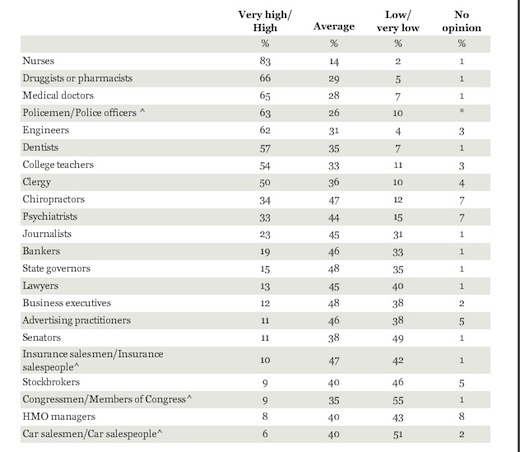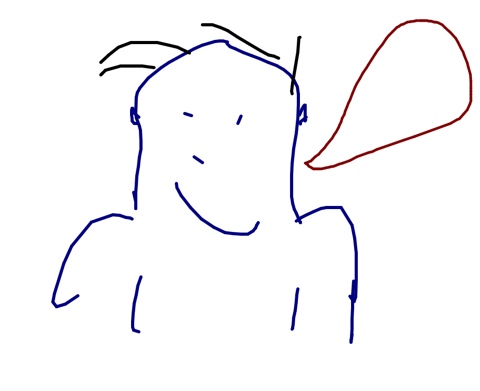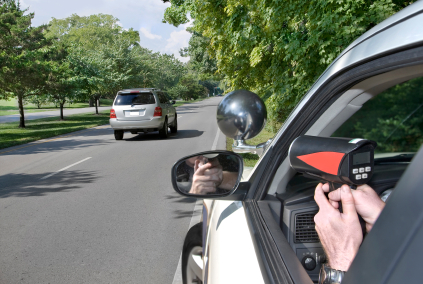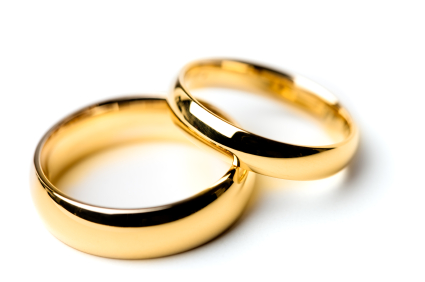I ran across this diagram recently about a survey of people’s perceptions on the most ethical professions. I was especially interested, obviously, in my own profession. At least we aren’t at the bottom, but we’ve certainly lost ground in recent years.
Tell me what you think:
What do you think is today’s most “ethical” profession?
Can we use labels such as this for any profession these days?
What makes a whole profession “ethical”?
In a “less ethical profession, do you know people who are “ethical”?
Is my profession, listed here as clergy, getting better or worse in its perception?
How does your profession rank? Is it a fair assessment?
What makes a profession ethical or not? Is it more perception…or more reality?
What say you?
I guess I’m slightly skeptical of labels, but I’ve seen these type studies before, so examine the diagram then give me your thoughts.







 Logging you in...
Logging you in...
 Loading IntenseDebate Comments...
Loading IntenseDebate Comments...
it's the individual who makes their profession ethical or unethical. Media has influenced this list. The few unethical folks compared to the hundreds or thousands who are in the same profession have blackened the profession.
That's a good point about the media. Certainly true in my profession. When a negative story breaks immediately it affects us all. Thanks Laurinda.
Twitter: joe_sewell
says:
Todd Rhodes recently retweeted a classic of his, dealing with the "feeding frenzy" caused by a scandal in church leadership. http://www.toddrhoades.com/?p=648
Thanks for sharing
Twitter: joe_sewell
says:
Very interesting thoughts. After reading through all the comments posted so far, I'd have to conclude that there is no such thing as an ethical profession. Instead, we must talk about, as Bonnie pointed out, an ethical professional.
While there may be some professions that are inherently unethical, all the rest really could be rated only by the potential ethical abuses in them. It should be obvious that all professions have the potential for unethical behavior, including the medical community and church leadership.
I love the idea of the "ethical professional". Thanks for adding to the discussion.
I am a nurse and glad that is evaluated as an ethical profession. But, my husband truck driver is a man of principle and I don't see that profession listed. We human beings are so prone to evaluating and not valuing. Ethics is not a professional issue but a personal practice. The nursing profession is one of service so people think "ethical" but not always the case individually. There are nurses who smoke and are overweight. Is that ethical? There are police officers who speed when they are driving personal vehicles, hmm? Maybe this is why ethics are so challenging.
Those are good thoughts. My uncle was a truck driver, and one of the most ethical people I knew. You ask great questions. Is it "ethical" for a nurse to smoke and be overweight…or a police officer to speed in personal vehicles. Good thoughts.
Twitter: joe_sewell
says:
More to the point, what about nurses who blame family members for inadequate care of patients, while they're taking a "break" because no patient has orders for them at that particular moment? (Yes, some patients would drain the time and sanity of any ethical nurse, but I've also experienced inept lazy people in the nursing profession who really need to be working somewhere else.)
Joe, sounds like you've had some personal experiences here that shape your thoughts. Thanks for sharing.
Twitter: joe_sewell
says:
Am I that transparent? Indeed, I have had several such experiences. I also know several nurses whom I've been thankful to know, and whom God placed in the right place at the right time, nurses to whom I'd trust my life.
Indeed, I have had several such experiences. I also know several nurses whom I've been thankful to know, and whom God placed in the right place at the right time, nurses to whom I'd trust my life.
What if someone worked in the adult industry and successfully promoted the use of condoms. Wouldn't that be ethical?
What an incredible question! It certainly shows the relativeness of the question on ethics. Similar to the question about an overweight nurse. What do you think?
Today’s most “ethical” profession — Nurses, teachers and fire man
Thanks. Why do you say those Uma?
I believe this list is another way for to alienate people. Rankings only edify the person or group in first place. It doesn’t matter if it’s for praise or pity.
Good call….I think you may be right. I'm skeptical of lists like this usually..partly for that reason.
I'm a professional fundraiser, and that isn't a career that shows up on this list. Its a career that doesn't get much recognition, until someone does something horribly unethical like embezzling funds, fraudulent solicitation of funds, or gross misuse of funds. I'm afraid if we showed up on this list, we'd be ranked somewhere between lawyers and congressmen, not exactly flattering.
Yet this general perception is a terrible misrepresentation of the majority of the field. If there were so many unscrupulous fundraisers, organizations like Compassion International or Samaritan's Purse wouldn't be able to function at all, and philanthropic activity would all but cease.
That knowledge about the perception of my own field – even though it isn't on this list – leads me to wonder how any of these professions can improve the public's perception of them, especially when the poor perception is garnered for the entire field by a small handful of individuals.
Good insight. I think you are right. Obviously, I'm somewhat familiar with that subject, since it take funds to operate a church. It seems we become less "ethical" as pastors when we ask for money. Thanks for sharing.
There are way too many unknowns and variables in that chart. We need to know things like religous outlook ( athiest or beleiver), politics,current and past vocation, number of traffic tickets, etc. of the people being surveyed.
One guy who gets caught speeding may not look as favorably on the police as a man who's life was saved by one.
As far as clergy, the previous poster probably nailed it; The relatively recent scandals have surely had a huge impact on how the clergy is viewed.This is speculation however, as correlation does not mean causation, but it is still a very good place to start.
Additionaly one has to wonder if the majority of the respondants were church going, how many of them had a personal hurt caused by clergy? It seems to me that there is more of a willingness to admit to church hurt these days than when I was Kid.
I agree Lloyd. Not sure a popularity poll can choose what is and isn't ethical.
I'm wondering if a side issue is people understanding the term ethical. I'm also skeptical of how someone defines a job as ethical even if they understand the meaning. For example, Police Officer. They only got a 63% high rating. Yet every time we see a story on them or firefighters, it's always from a stance of "hero". You'd think they would get a higher rating. I think that brings in the question of where did they go to get their data. We all know, whether we want to admit it or not, that there are large sections of the population who, rightly or wrongly, don't like the police or don't trust them and I think it has more to do with cultural bias or neighborhood bias than it does with reality. Unless the survey was conducted by individuals basing their rating on real world statistics, then I think the numbers are more about biased perception than reality.
But even if we take the numbers for what they are, the ones about clergy are also disappointing. I wonder how much of that has to do with the accusations against Catholic Priests over the years and about big media preachers more than it is about the clergy as a whole. I know that there are clergy who take advantage of their position and have inappropriate activities with children or vulnerable women who come to them for help. But the same can be said for probably almost any profession. I suppose we should hold the clergy to a higher standard, but still… it makes me go back to my first question about understanding the term "ethical".
I think you may be right Jon. The term ethical has almost become a subjective term.
I would define "an ethical professional" as one works for the best interest of others rather than themselves. so. i totally agree with the nurse. and can totally see where this is going to open a huge can of worms and step on some toes maybe. but a nurse has to deal with people at their worst and still perform. and they don't get paid Dr. pay so their motives are more prevalent.
Thanks. That's an interesting perspective. Would you say the higher the pay the more threat there is to the ethics of the profession? Just wondering based on the illustration.
Twitter: joe_sewell
says:
You have a good point about nurses, Bonnie. Sadly, I've seen too many nurses that are just plain incompetent and uncaring about their job. That doesn't really argue the "ethical" aspect of it, though, unless you take into account the ones who really don't care about doing their job well.
That brings into sharp focus the meaning of the term "ethical profession" vs. "ethical professional" or "ethical person."